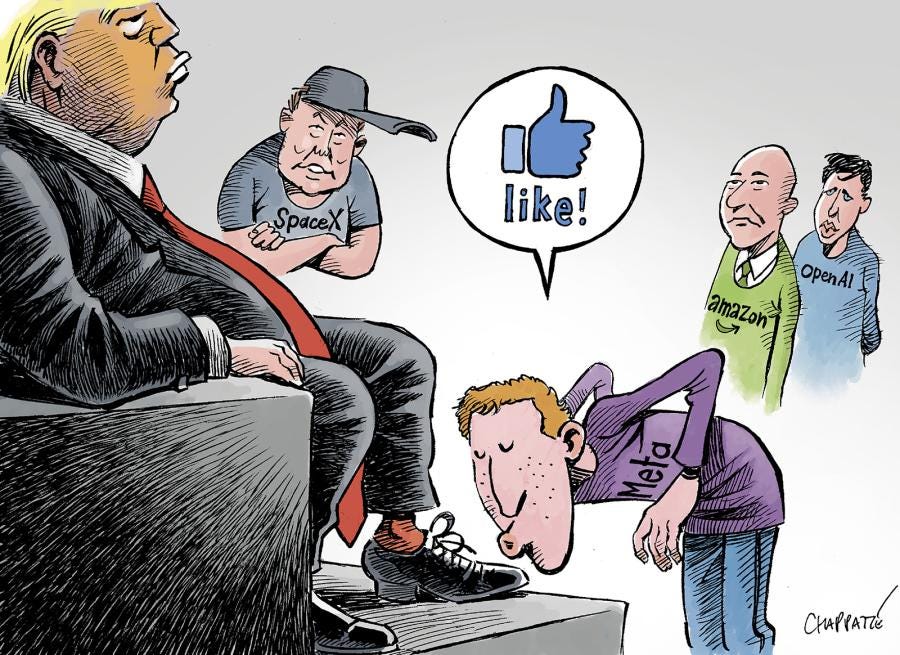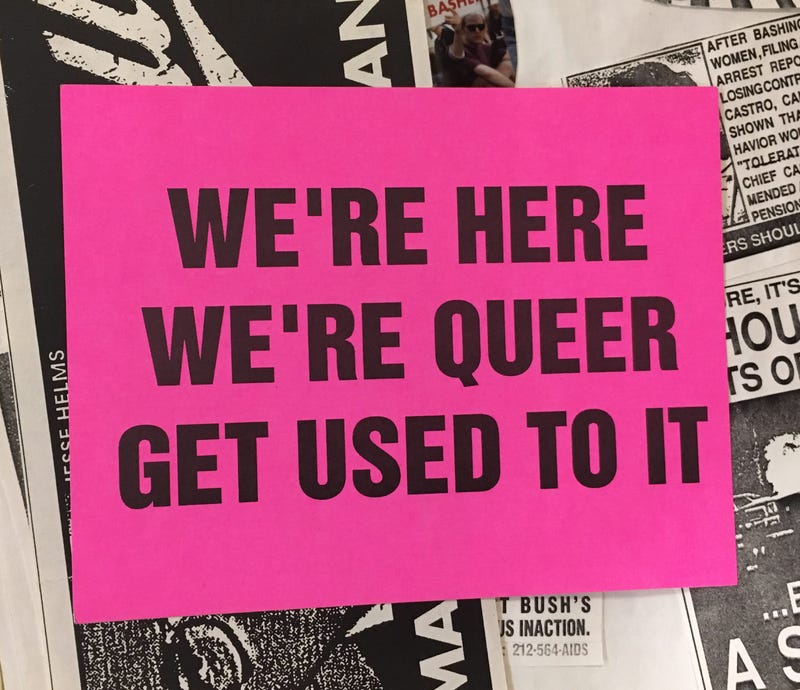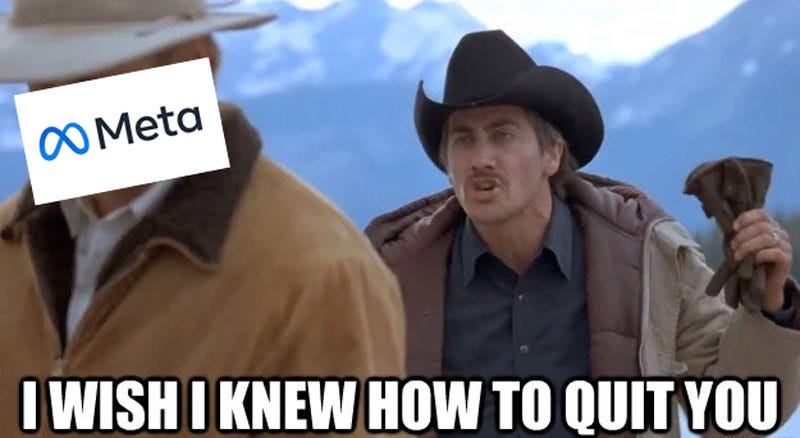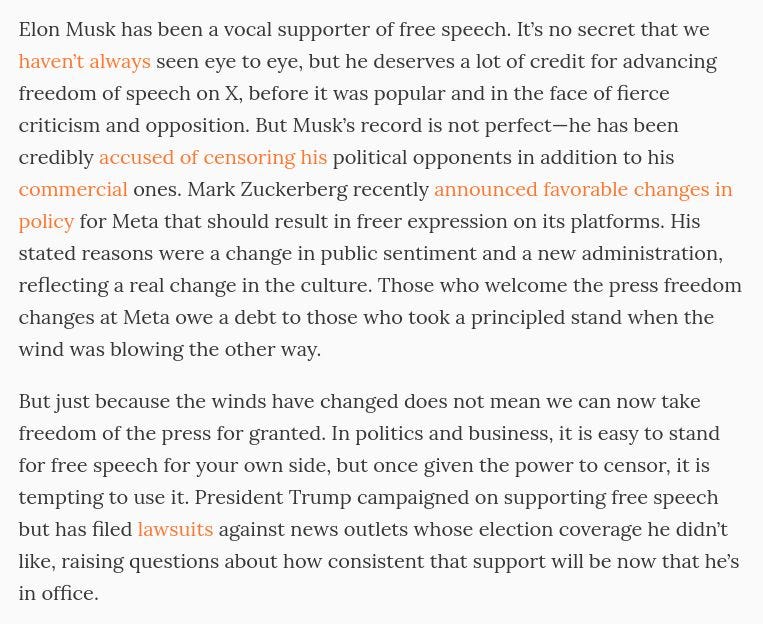>> Originally posted on Substack on January 29, 2025
I joined Facebook back in 2004, Twitter in 2008, and Instagram in 2010. I made good friends through these platforms, kept up with current events from firsthand accounts, and followed accounts that inspired me with their ideas and creations. For a few years, I even worked at a creative agency that helped companies embrace these channels of communication as we believed they were the best way to connect with their audience. And they were.
But not anymore.

⚠️ Why we should proceed with caution
This post is not meant to convince you why you should abandon these giant, established platforms. I’m still on all of them, after all. However, here are a few reminders that these companies are not our friends, do not care about our safety, and only exist because of the content we post, even though they have made it harder to see the content we want:
- Meta can delete your account and deny access to your content (including photos!)
- X/Twitter blue checks are no longer for accounts that are official channels of communication, just badges for paid accounts,
- Meta and X/Twitter are using your content to train AI unless you manually opt out
- Meta recently ended its fact-checking program, opting for “community notes,” similar to X/Twitter, and
- Meta makes Facebook & Instagram unsafe for LGBTQ+ users.
The fact that Mark Zuckerberg and Elon Musk were given special treatment at Donald Trump’s inauguration does not build up any trust that things will get better on those platforms either.
🤷🏻♂️ What can we do about our accounts?
Choose your own adventure:
- Download your information then delete all your Meta (Facebook, Instagram, and Threads) and X/Twitter accounts.
- Archive your data just in case, check your privacy settings, and continue to use these platforms at your own risk.
Either way, we must be more intentional with what we share and where we share. But that’s for another post, so let’s get back to the options for now…
Option 1
Abandoning ship
“Put your data where your mouth is” could be said about this route. Don’t want to support these companies? Say goodbye!
Numbers are important to social media platforms because that’s what the advertisers want to see. Many people participate in boycotting companies, like Starbucks, Hobby Lobby, and Chick-Fil-A. Do boycotts work? Sometimes!
But you may also take your data and head out simply because it feels gross to be associated with companies (and their supporters) that go against your values.

Here are links on how to archive your data:
Of course you’ll have to put in extra effort if you want to stay connected with the outside world though. I’ll share some ideas on how you can do that in the next post.
Option 2
Sticking around
Realistically, I understand why Option 1 is not feasible for most. Many rely on it to keep in touch with family and friends, promote their businesses, and stay in-the-know with the communities they belong to. These platforms serve as virtual town squares, group chats, marketplaces, and bulletin boards.
But the algorithm sucks you in and keeps you scrolling. You can check your privacy and security settings, but they seem to change often. And as the TikTok ban showed us, you never know when your content will become inaccessible.
Meta seems too big to fail, but that’s what I thought about Twitter once upon a time. Mashable published bleak stats, like “for the entire month of October, X saw a drop in anywhere from 300,000 to 2.6 million daily active users in the U.S. each day.”
So, why stay on these slowly sinking ships?

🏳️🌈 An argument for… and against Option 2
In this video essay by Council of Geeks titled, “Meta makes Facebook & Instagram unsafe for LGBTQ+ users,” Vera Wylde points out damning evidence in Meta’s community standards that some protections against hateful speech and threats were removed. In its place, Meta added examples of language that can be used in “political and religious discourse about transgenderism and homosexuality.” Language that suggests, “MENTAL ILLNESS OR ABNORMALITY.” 🚩🚩🚩

If you identify as gay, queer, or trans, then yeah, I absolutely do not blame you for leaving Facebook, Instagram, or Threads! We should not have to fear retaliation when we simply want to look at our friends’ photos, cat pics, marketplace listings, or viral videos. Protect your peace; take care of yourself.
On the flip side: At the end of Council of Geeks’ video, Wylde reminds us that representation is important.
It is important that we remain visible. It is important to the integrity of the community as a whole that we aren't scurried away to our little gay spaces where none of the straights ever have to see or think or hear from us ever again because then they don't have to ever think about how we're oppressed. …As far as they're concerned, we don't exist anymore. That's a win for them, so us leaving might punish Meta but it is going to reward MAGA. So, it's messed up. It's harmful for the community as a whole… because again, visibility matters. It matters that we simply exist in spaces so that people can see, “Oh, they're just people!” If we're not there, then our presence isn't a challenge to the claims of how awful we are. If we're not there, what is there to counter the spin of how terrible we are?

It's a situation where it would be best for the community as a whole if most of us stayed, but on an individual level, it's probably a good idea for a lot of us to leave because it's not safe anymore. There isn't a good option right now.
🤔 What will I do?
As I mentioned earlier, I’m still using Meta apps. I scroll Facebook to see what people are up to (local groups always have the tea) and sell stuff on Facebook Marketplace. Instagram was one of my favorite spots on the internet, but I continue to check it even though Stories and Reels have changed the vibe there, de-emphasizing photography. I had a great time on Threads when it first launched — the excitement of a new place that wasn’t X/Twitter was palpable. It was fun! And honestly, I still like it a bit.

But the “ick” has settled in, and it feels unsettling to spend my time with Meta apps now. I felt the same way about X/Twitter last year, and even though I still have it installed on my phone, I don’t check it multiple times a day anymore. In fact, I checked my screen time report on my phone, and I spent more time in my phone’s settings than X/Twitter this week.
I can change my ways!
And in my next post, I’ll share different ways you can stay connected online so that you can spend less time on Meta and X/Twitter and/or have more control over the content you post online. Because if we can’t change these big platforms, at least we can change how we use them.
🙃 edit: lol let’s add Substack to the list
…because prioritizing free speech over protections from hate speech is not it for a healthy online community.
Right before I published this, Substack posted this update which praises Elon Musk and commits to prioritize free speech over content moderation. It’s old news that Substack has a Nazi problem, but this announcement cements their stance on letting them stay.

I was just starting to like Substack and its different ways to connect to writers and readers. But, I will continue to (re)post to my blog at ninacdot.com and start looking for another virtual space that will put user safety over hate.
🥺 👉🏼👈🏼 Where are you? Where am I? Let’s connect?
Which platforms are you on now? I want to know the good, the bad, the ugly!
I can be found in these places for now:
- Bluesky: @ninacdot.bsky.social
- Instagram: @ninacdot
- Mastodon: @ninacdot@mastodon.social
- Threads: @ninacdot
- Self-hosted blog: ninacdot.com

